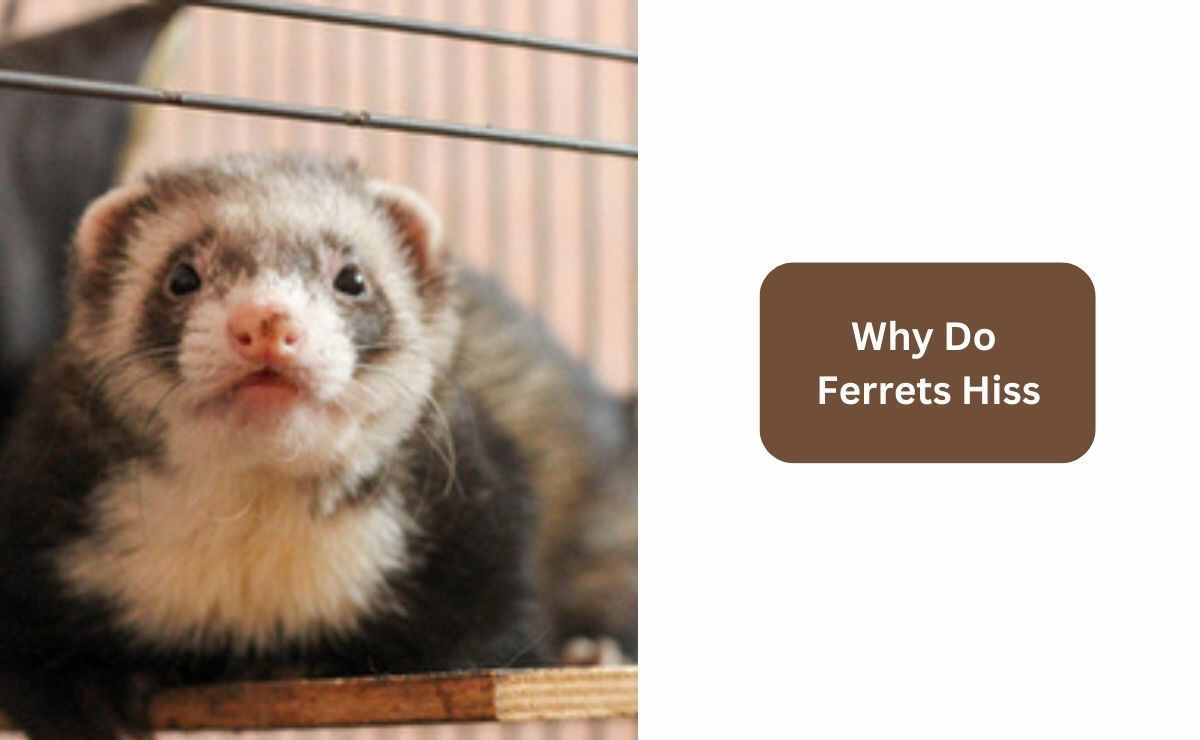Ferrets are generally adorable pets that have been popular among animal lovers for decades as they are cute and friendly too. However, despite their cute appearance and friendly demeanor, ferrets can sometimes exhibit behaviors that can be quite alarming to their owners. One such behavior is hissing.
Hissing in ferrets is not uncommon and can occur for various reasons. It may be a sign of aggression, fear, or discomfort. But why do ferrets hiss?
In this article, we will explore the reasons behind this behavior in pet ferrets and what it means for their overall well-being. So if you’re a ferret owner who’s heard your furry friend hissing or is just curious about these fascinating animals, keep reading to find out more!
Why Do Ferrets Hiss?

Ferrets hiss to communicate fear or aggression. This is a common behavior among many small animals, such as cats and snakes. Hissing is an instinctive response to perceived danger or a challenge from another animal.
Ferrets may also hiss when they are feeling stressed or uncomfortable. This could be due to loud noises, unfamiliar people or environments, or something else that makes them feel uneasy. In these situations, it’s important to give the ferret some space and time to calm down before approaching them again.
Finally, ferrets may also hiss when they are excited or happy. For example, if you offer them a treat or start petting them in a way they like, they may respond with a happy hiss!
Why Do Ferrets Hiss When Playing?
Ferrets hiss when playing for a few different reasons. First, they may be mimicking the sound of a snake to scare away potential predators. This is an instinctual behavior that ferrets have inherited from their wild ancestors.
Second, ferrets may hiss when playing as a way of communicating with other ferrets in their environment. Hissing can be used to signal dominance or submission and can help avoid conflict between two ferrets.
Some ferrets simply enjoy making noise and find it fun to hiss while playing. This is especially true if the hissing is accompanied by other playful behaviors like chasing or wrestling. So, while it’s important to keep an eye on your ferret’s behavior, don’t be too alarmed if you hear them hissing while playing – it’s likely just part of their natural playtime behavior!
Do Ferrets Hiss If They Get Hurt?
Ferrets hiss when they are feeling scared or threatened. This is a natural response to danger and is meant to ward off the perceived threat. It can also be used as a warning sign to other ferrets in the area.
When a ferret hisses, it is usually because it has been startled, injured, or is feeling uncomfortable in its environment. In these cases, the hissing serves as an alert that something isn’t right and that the ferret needs help.
The ferret may also be trying to protect itself from potential predators by making itself appear larger and more intimidating with its hissing sound.
Hissing is just one of the many vocalizations that ferrets use to communicate with each other and their owners. Other vocalizations include chattering, growling, barking, and even purring. Being able to recognize your ferret’s vocalizations can help you better understand their needs and provide them with the best care possible.
What Makes a Ferret Angry?
Ferrets can become angry when they feel threatened or uncomfortable. It’s important to be aware of their body language and behavior so you can recognize when they are feeling angry.
Ferrets may show signs of anger through hissing, growling, biting, and lunging. They may also become agitated if they are startled or if they feel like their space is being invaded. If a ferret is feeling threatened, it’s important to remove the source of the threat and give them some time to calm down.
It’s also important to provide your ferret with plenty of enrichment activities throughout the day as boredom can lead to aggression in ferrets. Providing them with plenty of toys and activities will help keep them entertained and reduce any potential outbursts of anger.
How Do You Calm an Angry Ferret?
Calming an angry ferret can be a challenging task. The best way to handle this situation is to remain calm and patient. If the ferret is showing signs of aggression, try distracting it with toys or treats. This will help redirect its focus away from the source of anger. Additionally, if possible, remove the ferret from the situation that is causing it to become angry.
If the ferret remains agitated, you may need to use a calming technique such as gentle stroking or speaking in a soothing voice. It is important not to yell or scold your ferret as this could further agitate it and make matters worse.
At last, make sure your ferret has plenty of time for play and exercise each day as this can help reduce stress levels and prevent outbursts of anger in the future.
Is Hissing Bad for Ferrets?
Hissing is a normal behavior for ferrets and is not necessarily bad. It can be used as a warning signal when they feel threatened, scared, or uncomfortable. This can happen if they are startled by a sudden loud noise or if someone approaches them too quickly.
When ferrets hiss, it’s important to give them some space and let them calm down on their own. If your ferret continues to hiss after you have given them some time to adjust, then it could be an indication of an underlying health issue that needs to be addressed by a veterinarian.
However, hissing is not something to worry about unless it becomes excessive or occurs frequently. If this happens, it’s best to take your ferret to the vet for an evaluation.
Conclusion
Hissing is a natural behavior for ferrets and serves as a warning to potential threats. It can also be a sign of fear or discomfort. As pet owners, it’s important to understand why our ferrets may hiss and address any underlying issues that may be causing it.
By providing them with a safe and comfortable environment, regular playtime, and gentle handling, we can help reduce their stress levels and minimize hissing behavior. Remember to always approach your ferret calmly and respect their boundaries. With patience and understanding, you can build a bonding relationship with your furry friend.
